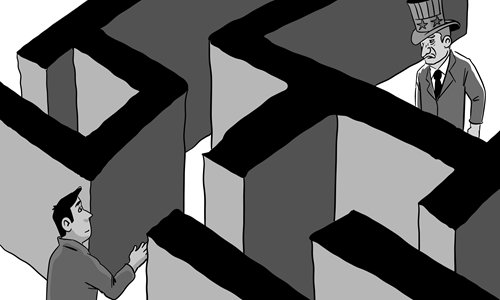HOME >> BUSINESS
Tried and tested US tactics fail against China
By Zhou Dewu Source:Global Times Published: 2019/6/17 17:58:39

Illustration: Luo Xuan/GT
The importance, and complexity, of China-US relations is self-evident. Chinese leaders have expressed, on several occasions, that what China has done is to complement the current system rather than starting a new one. But the US is not willing to accept this as truth.
Westerners are inclined to believe that a strong country will inevitably become hegemonic. However, influence and hegemony are two different things; a responsible benevolent power is very different to a power that bullies others at will.
The US cannot contain China and China cannot weaken the US. From a historical perspective, the US defeated the Soviet Union and Japan - one was a military superpower but dwarfed in the economic arena, and the other was an economic giant with restrained military powers, respectively. China's GDP is approaching the 67 percent mark of US GDP, unlike the Soviet Union and Japan that were only at 30 percent of US GDP.
Even though facing reality is the first step toward the right decision, this process can be long and winding. US President Donald Trump is trying to find solutions to the current trade war with China by searching through history. The US has put Robert Lighthizer, who negotiated trade deal with Japan three decades ago, in charge of the trade talks with China. The US' strategy of using both political and technological warfare is an old tactic that they used against the Soviet Union.
The comprehensive measures taken by the US could push China-US relations to a new Cold War. Some experts worry that the bilateral relationship could fall to a point where it would be hard to repair.
The US has been trying to motivate other parties to forge a united force against China. By cutting off the supply chain to the Chinese technology giant Huawei, the US has greatly altered the nature of the trade friction, taking a dangerous step further toward an economic and technological decoupling between the two countries.
The latest sets of measures that the US has implemented to block China have been met with very little support from the international community. The world has become deeply integrated and codependent. China is now an economic giant; its large consumer market has been a huge attraction for the rest of the world.
China has recently issued a white paper on the China-US trade talks, uncovering the real reasons why the talks have suffered a setback. China has made it clear where it stands. But does China understand the real reason behind the US-initiated trade war?
The approach taken by the US is most economically imprudent, but they have been firm on their position also. The motives behind this stance are quite political. The election of Trump is a byproduct of a divided US. Former US first lady Michelle Obama has criticized Trump's lack of moral leadership. Trump and his fickleness have put the world in great uncertainty. Although it might seem a mess, Trump has his own set of logic. On the one hand, he will use all available resources to keep the US in a leading position. On the other hand, the Republican elites, who did not initially favor Trump, have benefited from Trump being the president. The Republicans' pro-establishment strategists would rather use Trump to lead the China-US relation to a confrontation.
In fact, Trump is confined within the electoral logic. Trump had a risky win with 2.86 million fewer votes than Hillary Clinton in the last election. Trump, who would like to win a second term, will need to keep his main base supporters, who do not see the benefits of globalization, happy. Returning the manufacturing industry to the US will not be easy. Trump has adopted very harsh methods to cut off China's production chain, so that multinational companies' overseas profit margins become significantly slimmer. If some firms were on the fence before, now they are seriously starting to consider moving back to the US.
In this sense, only calculating the gain and loss of the trade war from an economic standpoint is not a valid measure. Buying cheap products from Walmart is important, but having a job is more so since it relates to people's dignity and wellbeing. The approach taken by Trump has provided unemployed groups and blue collar workers with reassurance; therefore, it is not surprising that countries like China and Mexico will take the hit.
One lesson from the "Thucydides trap" is that the rise of a country is not the problem, the problem starts when the incumbent nation is afraid of its challenger. As an expert has warned, the US may have overreacted to the threat from China. Joseph S. Nye said, in one of his articles, that metaphors like the "Thucydides trap" could "become dangerous when they convey a sense of historical inexorableness."
The bilateral talks between China and the US may find common ground in creating more jobs and could help build a social basis for China-US cooperation and make the economic decoupling less volatile.
Making louder and more accusations does not solve problems. The tension between the two countries is detrimental to the world. Moreover, issues such as denuclearization, the situation in the Korean Peninsula and climate change will need the collaboration of China and the US. Roads are made by people, and so too are bilateral relations. History does not offer answers for present. By breaking the walls of ignorant and narrow mindedness, the China-US relationship can get on a road with a hope of success.
The author is deputy editor-in-chief of Hong Kong-based newspaper Ta Kung Pao. bizopinion@globaltimes.com.cn
Posted in: INSIDER'S EYE